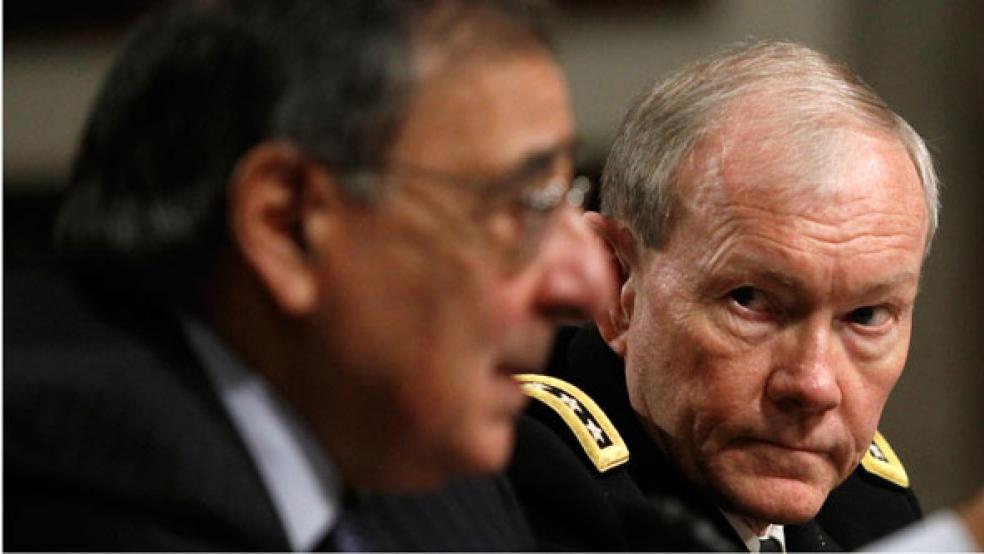In his farewell analysis of national military strategy, retiring chair of the Joint Chiefs of Staff Martin Dempsey this week offered a sobering and somewhat scary assessment of the military and global challenges facing the United States.
Dempsey, President Obama’s senior military advisor, minced few words in spelling out the challenge. “Today’s global security environment is the most unpredictable I have seen in 40 years of service,” he wrote in a report released on Wednesday. “Since the last National Military Strategy was published in 2011, global disorder has significantly increased while some of our comparative military advantage has begun to erode.”
Related: 10 Things You Need to Know about America’s Top General
He warned the Defense Department it must reorganize its global footprint and improve its agility and innovation to succeed in the prolonged war against terrorist groups including ISIS in the Middle East and nations that use proxies to fight on their behalf. “We must be able to rapidly adapt to new threats while maintaining comparative advantage over traditional ones,” Dempsey wrote. “Success will increasingly depend on how well our military instrument can support the other instruments of power and enable our network of allies and partners.”
Dempsey also cautioned about a "low but growing" probability” of the United States fighting a war with a major power, with "immense" consequences. Russia, for example, has “repeatedly demonstrated that it does not respect the sovereignty of its neighbors, and it is willing to use force to achieve its goals” – a direct reference to President Vladimir Putin’s military support of ethnic Russian rebel forces in eastern Ukraine.
"Russia's military actions are undermining regional security directly and through proxy forces,” Dempsey wrote in the 2015 National Military Strategy report.
Dempsey, 63, an Army four-star general and the 18th chair of the Joint Chiefs, will step down this fall and leave behind a legacy of caution about U.S. military engagement and reliance on local partners in the Middle East and elsewhere. He will be succeeded by Marine Corps commander Gen. Joseph Dunford Jr., who reportedly shares many of Dempsey’s views.
Related: Most Americans Want Obama to Send Ground Troops to Battle ISIS
As Defense One noted, the military has been shrinking since 2012 when the Obama administration first announced plans to pivot forces to the Asia-Pacific region as troops withdrew from Afghanistan and Iraq. Since then, however, the president has slowed the Afghanistan withdrawal as fighting there continues and thousands of American military forces have returned to the Middle East and North Africa.
For now, at least, U.S. forces are not assigned in Iraq to combat roles. But Dempsey and other U.S. commanders have repeatedly warned that it could take decades to defeat ISIS, and many Republicans believe the U.S. ultimately will have no choice but to send in more ground troops to fight ISIS.
Here are five important takeaways from Dempsey’s parting military strategy report:
- Violent extremist groups led by al Qaida and the self-proclaimed Islamic State are working to undermine trans-regional security, especially in the Middle East and North Africa. “Such groups are dedicated to radicalizing populations, spreading violence and leveraging terror to impose their visions of societal organization.” The U.S. military does not have the luxury of focusing on one challenge to the exclusion of others.
Related: U.S. Shoots Itself in the Foot by Accidentally Arming ISIS
- The military will continue its pivot to the Pacific, but its presence in Europe, the Middle East, Latin America and Africa will evolve. The military must remain “globally engaged to shape the security environment.”
- The Russian campaign in Ukraine has military strategists questioning if traditional U.S. military force as it is deployed globally is still enough of deterrence to hybrid and non-state threats. Russia’s military actions are undermining regional security directly and through proxy forces. “If deterrence fails, at any given time, our military will be capable of defeating a regional adversary in a large-scale, multi-phased campaign while denying the objectives of – or imposing unacceptable costs on – another aggressor in a different region.”
- Iran -- which currently is negotiating a nuclear non-proliferation agreement with the U.S. and others – also poses strategic challenges to the international community. “It is pursuing nuclear and missile delivery technologies despite repeated United Nations Security Council resolutions demanding that it cease such efforts.” Moreover, Iran is a state-sponsor of terrorism that has undermined stability in many nations, including Israel, Lebanon, Syria and Yemen.
- Beijing is pursuing “aggressive land reclamation efforts” in the South China Sea where it is building military bases in on disputed islands. In the same region, on North Korea, “In time, they will threaten the U.S. homeland,” Dempsey wrote, mentioning Pyongyang’s alleged hack of Sony’s computer network.
Top Reads From The Fiscal Times:





